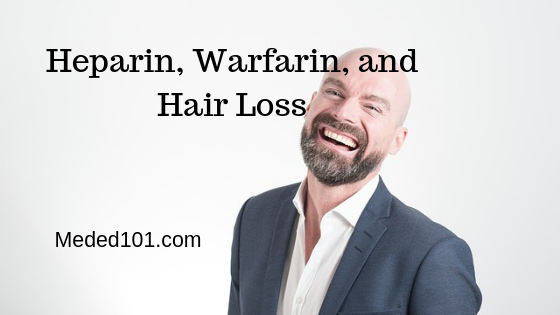I recently did a podcast episode on heparin (which you can listen to below) and I did not mention hair loss as a potential adverse effect. In addition to heparin, it turns out there is data on other anticoagulants and this adverse effect as well.
That begs the question, what should we do about this?
The first question to consider is if the patient is actually having hair loss. If they aren’t, no worries in that respect. It is something that can be monitored over time in patients who are taking chronic anticoagulation. Hair loss is likely going to be a slow, progressing side effect. (i.e. you probably aren’t going to notice it within a week or two of starting one of these agents).
The next question I would consider is, does hair loss matter to the patient? I think about my dad who doesn’t have a lot of hair left to lose, and he likely wouldn’t care if he lost what he has left. If you compare that to a younger patient, that hair may be very important to them. Working with the patient to assess the risk of switching anticoagulants versus the adverse effect of hair loss would be an important clinical consideration.
Heparin is a drug that is often only used short term. If this is the case, we’d anticipate that the adverse effect of hair loss would be short-lived or it wouldn’t even have time to occur. Warfarin therapy, on the other hand, tends to be used more indefinite. In the situation of a patient with hair loss who needs to be on warfarin, it presents a little more of a challenge. However, with the recent atrial fibrillation guidelines, the newer anticoagulants are preferred in the majority of situations. So switching over to the newer agent may have a dual purpose. There is also the thought that hair loss is associated with the same mechanism of the anticoagulant effect. We don’t have a lot of information on whether the newer agents will cause hair loss or not, but there is some data out there.
Probably one of the biggest challenges with the adverse effect of hair loss is that it may be subtle and not recognized to be caused by these agents. To put it simply, it will likely take a while for this adverse effect to show up. I think the best advice is to recognize a patient who may be taking an anticoagulant who is reporting hair loss. If the hair loss is deemed to be caused by an anticoagulant, discuss it with the patient, and develop a plan of action that is in line with the patient’s beliefs, risks of adverse effects, and benefits of the anticoagulant.
- 30 medication mistakes PDF
- 18+ Page Drug Interaction PDF
- 10 Commandments of Polypharmacy Webinar based on my experiences in clinical practice



I have been on a blood thinner for six years. I switched to Eliquist last year, it have gone back on Coumidin because of the huge price difference.! I have lost half of my hair and it continues to fall out! How can I be sure it is the Coumidin and what can I use instead? I was still losing my hair on the Eliquist! I take Soma and once read that causes hair loss.
I have thinning hair take warfarin too
On Eliquis for 7 months had beautiful long thick hair now I’m starting to see my scalp. I brush very easy once a day and my bush is full. I belong to 5 AFib support groups and many who are on Eliquis or Xeralto have same complaint. And a lot of Dr.s don’t believe us. Was wondering if there is any kind of solution???? I take Biotin with keratin, collagen peptides and rub pumpkin seed oil on my scalp…to no avail so far. Was thinking of takin an antidepressant cause this AFib and hair loss is depressing me. But then I read that antidepressants can cause hair loss also
I, too, have been experiencing hair loss and it is very disturbing! I have been on blood thinners for months – the most current since hospitalization is Warfarin. I really need to know how to save the rest of my hair!
Warfarin has been out there for decades, so the side effect of hair loss is well documented. This is obviously a bigger issue for women than men. I started on Warfarin a year ago and started to notice my hair thinning out about 4 months into it. I didn’t attribute it to the Warfarin until a couple of months ago. Because it doesn’t appear to cause a medical issue this side effect is ignored by researchers. It seems likely that the DOACs have the same side effect (plus a host of other negative sides). It is essentially depressing, but as a male one choice I have is to cut it all off, the other is to get off of blood thinners all together. Initially I’ll be choosing the former. However I have prooxymal Afib which rarely happens, and I mean really rarely. I done plenty of my own research and haven’t yet 100% bought the idea that I’m destined to have dangerous Afib. Current estimates that I have found are that one needs to have persistent events of Afib each for 48 hours or longer to develop clots. I have yet to find any antidote for this hair loss while on blood thinners.